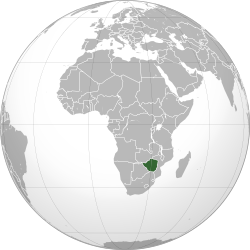Zimbabwe-Rhodesia
| Zimbabwe Rhodesia | ||||||||||
| Unrecognised state | ||||||||||
|
||||||||||
|
||||||||||
|
Motto Sit Nomine Digna (Latin) "May she be worthy of the name" |
||||||||||
|
Anthem "Rise, O Voices of Rhodesia" |
||||||||||
| Capital | Salisbury | |||||||||
| Languages |
English (official) Shona Sindebele Afrikaans |
|||||||||
| Government | Parliamentary republic | |||||||||
| President | Josiah Zion Gumede | |||||||||
| Prime Minister | Abel Muzorewa | |||||||||
| Historical era | Cold War | |||||||||
| • | Established | 1 June 1979 | ||||||||
| • | Disestablished | 12 December 1979 | ||||||||
| Area | ||||||||||
| • | 1979 | 390,580 km² (150,804 sq mi) | ||||||||
| Population | ||||||||||
| • | 1979 est. | 6,930,000 | ||||||||
| Density | 17.7 /km² (46 /sq mi) | |||||||||
| Currency | Rhodesian dollar | |||||||||
|
||||||||||
Zimbabwe Rhodesia /zɪmˈbɑːbweɪ roʊˈdiːʒə/ was an unrecognised state that existed from 1 June 1979 to 12 December 1979. Zimbabwe Rhodesia was preceded by an unrecognized republic named Rhodesia and was briefly followed by the re-established British colony of Southern Rhodesia, which according to British constitutional theory had remained the proper government after Unilateral Declaration of Independence (UDI) in 1965. About three months later, the re-established colony of Southern Rhodesia was granted internationally recognised independence as the Republic of Zimbabwe.
Under pressure from the international community to satisfy the civil rights movement by blacks in Rhodesia, an "Internal Settlement" was drawn up between the Smith administration of Rhodesia and moderate African nationalist parties not involved in armed resistance. Meanwhile, the government continued to battle armed resistance by Soviet backed neo-Marxist forces it referred to as "terrorists" - the Rhodesian Bush War was an extension of the Cold War, being a proxy conflict between the West and the Soviets, similar to those in Vietnam and Korea.
The "Internal Settlement" agreement led to relaxation of education, property and income qualifications for voter rolls, resulting in the first ever black-majority electorate. The country's civil service, judiciary, police and armed forces continued to be administered by the same officials as before, of whom most were whites, due to the composition of the upper-middle class of the period.
...
Wikipedia



